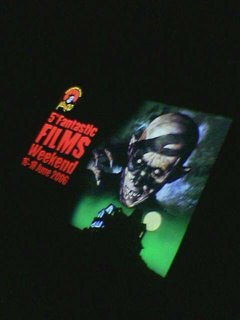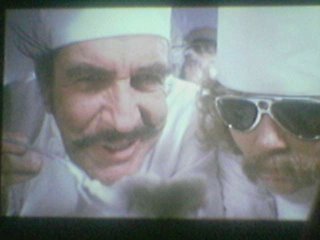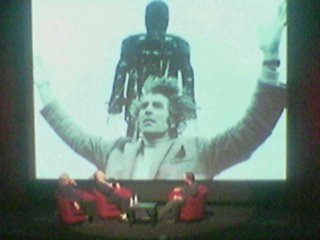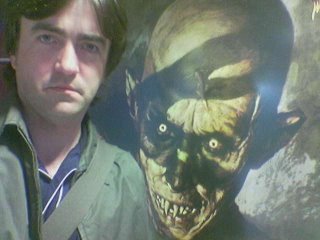I’m off to London tomorrow to have a meeting about a potential new project. I’m not sure I’ve actually got anything appropriate for it – since I heard about it, I’ve been trying to dredge up some of the odds and ends of aborted/unformed ideas that I usually have buried in the mud of my back brain, and scattered about on the hundreds of notebooks that live in loose piles on my desk and in my bag and in the inside pockets of jackets I’ve long since stopped wearing.
Despite coming from London, and having the bulk of my family still living there, I don’t actually go down there that often. It’s a question that often gets thrown at Nottingham filmmakers – ‘You ever thought about moving down there?’ – but most of the filmmakers I know don’t really seem to be interested.
Maybe because Nottingham has never really had much of a solid connection to what most people would consider to be ‘the industry’, but there doesn’t seem to be that much of a feeling that London is something to aim towards. This can lead to accusations of parochialism and a lack of ambition, but I think it’s down to a different kind of sensibility. I think you head for London if you want to be at the centre of things, if you want to feel like you’re where the majority of ‘things’ happen. For me, I’m quite happy not to be at the centre of things. I like being on the outside, on the fringes, making work in a way that isn’t necessarily ‘the industry way’.
The difficulty is that there is always a pull towards a more ‘industry’ way of working. If you want to stay in Nottingham and work with the people you’ve always worked with, there is a perception from funders that you aren’t willing to take the next step up, to become a ‘proper’ filmmaker. It’s a conversation I had recently with Chris Cooke – how much do you keep your way of working as your opportunities (and budgets) grow larger in scope? Do you work with crews/cast from outside the region because they’ll help you learn different ways of working, or do you stick with what you know? The latter option again lays you open to accusations of a lack of ambition, even an arrogance, but then the idea that someone who is more based in ‘the industry’ will know better than you how to make films isn’t something that I necessarily go along with either. Maybe it all just comes down to people, and to their sensibilities – you try and work with the best people possible for the particular project that you’re making, regardless of where they’re from.
I would argue that the fact that a lot of filmmakers in Nottingham haven’t been through film school, or worked their way up from runners on big productions, or even had a full-time job in the industry, has been one of the major factors in the development of the particular filmmaking culture in this region. Last time I was in London, I had a number of people say to me how they had heard great things about ‘the Nottingham scene’ and were really interested in how it worked and how it came about, and I think that it’s only when you go to other places that you realise how particular to Nottingham (and maybe the East Midlands in general) the filmmaking sensibility is.
Of course, it’s hard to generalise, because there are so many different types of films being made in the region, and it would be impossible to pigeonhole them as having a house style, but I think what is maybe unique is the fact that so many filmmakers co-exist together and work together in such a (for the most part) mutually supportive and uncompetitive way.
Probably because of the lack of any formal industry structure in the region and the general scarcity of funding, people tend to get on with a lot of things on their own. The East Midlands was one of the first regions to really embrace DV technology, and as soon as people became able to first rent, then buy MiniDV cameras, the filmmaking scene really took off, with most filmmakers working for each other as cast and crew in a kind of unofficial bartering system, something that still continues today.
At the moment, and over the past few years, I think the East Midlands has produced a great number of exciting and talented filmmakers. People like
Simon Ellis,
Dena Smiles,
Gareth Howell,
Jeanie Finlay,
Mark Devenport,
Tim Cunningham,
Lucas Roche, John Ross and
Iain Finlay. In the horror genre, we’ve also got
Andy Brand and
Owen Tooth, with newer filmmakers like Owen Davies and Cheryl Marshall starting to produce good work as well.
The Nottingham scene has grown quite independently and retains a sense of closeness, at least amongst a certain generation of filmmakers, many of who see and work with each other on a regular basis. However, in the past couple of years, with the dissolution (and absorption into Broadway Cinema) of Intermedia Film and Video – the non-profit organisation which was key in the development of both Shane Meadows and Chris Cooke, among many other East Midlands filmmakers – the sense of growth and development, at least in the sense of there being a loosely-affiliated group, seems to have slowed. Opportunities to make funded films haven’t grown beyond a certain fixed point – once you’ve made a digital short, you’re pretty much on your own – even DVShorts Plus, which is the scheme my new film’s supposed to be developed under is running late (my application, submitted in Jan 2006, was for DVShorts Plus 2005, and the way it’s looking, it won’t be delivered until 2007…), with no other apparent options for progressing in terms of making more shorts.
Of course, maybe some of this is myopia on my part – I see the filmmakers who I’m friends with and maybe place us too centrally in the Nottingham filmmaking scene – maybe there are loads of other collectives or individual filmmakers who are developing furiously that I’m unaware of. But there is the worry that without the developmental support of the existing funding bodies, a whole load of filmmakers will be discouraged from being able to progress in the industry.
Which I suppose brings me back to an earlier point. Which is – do you want to be part of ‘the industry’? Part of me thinks that independence is the single most undervalued quality in filmmaking. Because of the structure of the industry in this country (and I really wish I could find a better term than ‘the industry’ – it makes it sound like we all work in factories), you are encouraged as a filmmaker to view progress and development in a very standardised, centralised way – get a couple of (progressively larger budget) funded shorts under your belt, develop a funded feature, aim for BAFTAs and Oscars.
But that’s not the only route available – if you ignore the idea of ‘the industry’ and just concentrate on making work, there’s nothing to stop you. Well, apart from the lack of funds, obviously, but even this is surmountable. Some of the best, most memorable films of the past three decades have been independent – at least in terms of their initial production – and have come about through filmmakers taking risks and not waiting for funding. It just so happens that in this country, without the stamp of supposed legitimacy that a Film Council or Film Four logo would bestow upon your film, independent films are viewed as the equivalent of the vanity press.
Part of me really likes the idea of working outside ‘the industry’, or at least trying to make work within it on my own terms, without buying into the supposed career path that seems be laid out, and without buying into the supposed ‘glamour’ that the British film industry currently dotes on.
When “One For The Road” came out, the best – and to my mind most perceptive review came from Will Self in the London Evening Standard. As well as introducing the word ‘adipose’ to my vocabulary and talking about the look of the film as having ‘the natural feel of a jaded eye encrusted with bilious wakey-dust.’, he also noted why he thought the film stood outside the norm.
“The British film industry - such as it remains - is all too often distracted by the escapism implicit in high production values. Yet the matted reality of Britain cannot be conveyed by such a high gloss.
In a way, this film is a peculiar allegory of the dilemma of British filmmakers, who, perforce, end up as fantasists pursuing a money man, as long as they remain here.
When new directors do emerge, they are all too often snaffled up by Hollywood, or by a Hollywoodised production, where the involvement of "star" actors determines the investment. There are notable exceptions to this - but they are exceptions.”
I think that maybe if there is a unifying feature among East Midlands filmmakers, then it is maybe this distrust of rejection of this idea of ‘high gloss’ (which isn’t too say that there isn’t a good finish to a lot of East Midlands films, just that it isn’t regarded generally as being necessarily a good thing). Rather than falling for the idea of the ‘glamour’ of filmmaking, maybe East Midlands’ filmmakers remain ‘aglamourous’ – it’s not something at the top of their list of concerns.
Again, maybe I’m ascribing my own feelings to others, to try and come up with a rationale for why so many filmmakers seem to work with and for each other in this region, but I do think that Nottingham’s natural tendency towards outsider status is one of the key elements in the development of a strong, diverse and challenging filmmaking scene.



 With only a quick break, we were back in for a new print of ‘Theatre of Blood’, which John hadn’t ever seen. ‘ToB’ was one of the first horror films I really remember – I think back when I was a kid they used to show horrors late at night on Saturdays and there are certain scenes from the film that really stay with me – Michael Hordern’s death, stabbed repeatedly by a group of tramps in a warehouse, his blood smearing the polythene; Robert Morley as a camp theatre critic being forcefed his own poodles – as well as bits that I couldn’t remember – Vincent Price in a giant afro as a camp hairdresser seems to have been entirely wiped from my memory. It’s a great, funny, horrific, mad and effective horror film, one that really goes for it in a way that not many films do nowadays.
With only a quick break, we were back in for a new print of ‘Theatre of Blood’, which John hadn’t ever seen. ‘ToB’ was one of the first horror films I really remember – I think back when I was a kid they used to show horrors late at night on Saturdays and there are certain scenes from the film that really stay with me – Michael Hordern’s death, stabbed repeatedly by a group of tramps in a warehouse, his blood smearing the polythene; Robert Morley as a camp theatre critic being forcefed his own poodles – as well as bits that I couldn’t remember – Vincent Price in a giant afro as a camp hairdresser seems to have been entirely wiped from my memory. It’s a great, funny, horrific, mad and effective horror film, one that really goes for it in a way that not many films do nowadays. 



